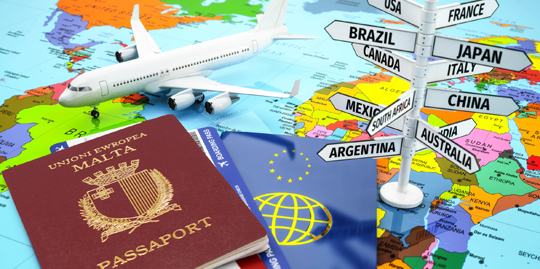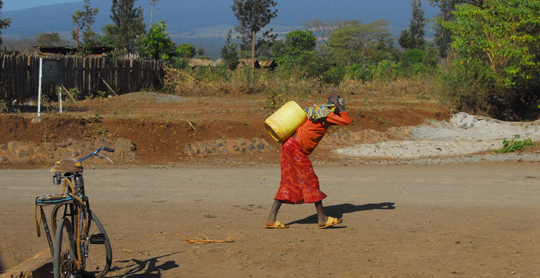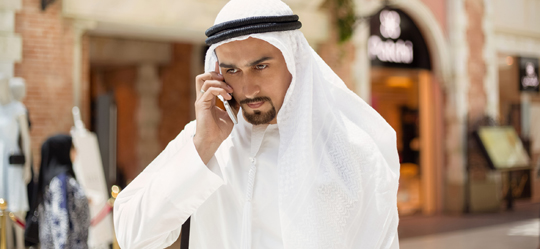Exclusive Club
Freiburg, Apr 18, 2017
Some European Union (EU) countries sell citizenships. This creates loopholes for the rich and increases the obstacles of migration for the poor, criticizes the Freiburg sociologist Prof. Dr. Manuela Boatca. She calls for opening the borders instead.
The 25-year-old Fatuma slings the empty container over her shoulder. Like every day, she will cover the five kilometers from her village in Ethiopia to the closest watering place by foot. Her hut has neither running water nor electricity. But Fatuma is lucky: A few days ago she survived a severe case of diarrhea, although there are no doctors nearby. Greta, also 25 years old, sits in her Swedish hometown several thousand kilometers away studying German in front of her computer. She recently completed a degree in business administration and will start a position at an IT firm in Frankfurt in a few weeks.

Valuable document: Holders of Maltese passports have the right to live, work, study, or go to school in all 28 countries of the European Union and in Switzerland. In addition, they can travel to 151 countries without having to first obtain a visa. Photos: Maksym Yemelyanov, keki, 12ee12 (all Fotolia); Montage: Kathrin Jachmann
An Ethiopian and a Swede – two very different life realities. Manuela Boatcă is interested in how this inequality comes about and why it persists. The main aspect the Freiburg sociologist is focusing on is citizenship. “Fatuma’s and Greta’s nationalities determine what possibilities they have to travel without a visa or migrate.” Even more importantly, at least for people who do not live in an industrialized country, citizenship also determines whether one has access to clean water, food, education, health care, and security.
In other words, citizenship is a valuable asset. Several countries of the EU have recognized this: Since the financial crisis of 2008, more and more economically stricken member countries have been using the sale of citizenships or residency permits qualifying the holder for later naturalization as a profitable source of revenue. This practice in particular caught Boatcă’s attention. “I’m interested in the double standard wealthy countries apply when poor and rich people want to migrate.”
Boatcă analyzes migration flows and political developments that dictate what conditions people from poor countries need to fulfill to migrate to an EU country. Greta can travel through most countries around the globe without a visa, and thanks to the Schengen Agreement she doesn’t even need special permission to work in Germany and many other countries. Fatuma, on the other hand, can travel to just 36 countries with an Ethiopian passport – all of them poor like her native country. Entering the EU legally or living there is practically impossible for her. She would need to work many hours even just to earn the money to purchase a passport. Greta, by contrast, can buy a passport with a single hour’s wage.
Fatuma’s situation would be completely different if she were rich. Then she could become a citizen of Malta by investing 650,000 euros in government bonds, 350,000 euros in sovereign wealth funds, and 150,000 euros in real estate. The important thing here is of course not Maltese nationality as such but the fact that Maltese nationals have the right to live, work, study, or go to school in all 28 EU countries and in Switzerland, as well as to travel to 151 countries, including Canada, without having to first obtain a visa. Other EU members, like Hungary, Latvia, Greece, Portugal, and Cyprus, also do business with these coveted papers. Latvia offers a five-year residency permit with the possibility of an extension for a mere 140,000 euros.

Citizenship limits the possibilities of people from poor countries to travel, let alone migrate. It therefore also determines who has access to clean water, food, education, health care, and security. Photo: Africa/Fotolia
Male Privilege
“EU citizenship is like a bundle of privileges in an exclusive club,” says Boatcă. Those who have the luck of living on EU territory enjoy these privileges. Those who do not are excluded from them. However, the sale of citizenships has opened up a loophole in the past years for a small number of non-EU citizens, particularly from China, Russia, or the Arab world, who are already privileged as it is. “For impoverished people from underdeveloped regions who are often motivated by existential concerns, on the other hand, an EU passport is an unattainable luxury.”
And it is not just poverty that is standing in Fatima’s way. Besides citizenship, Boatcă is studying another determinant of living conditions that is generally predetermined at birth: gender. This can be an important factor for privileges like an education, because many poor families in developing countries send their sons to school first. Only if they can scrape together enough money for the school fees can their daughters also enjoy a school education. Sons have priority even with regard to food. If there is not enough to eat for everyone, the girls often have to make do with whatever is left over after their brothers have finished eating. This places them at a greater risk of malnutrition and of dying before they reach the age of five. By contrast, food shortages are generally not an issue in rich countries, so gender is not relevant in this regard. In addition, Greta is required to go to school until her sixteenth birthday in Sweden.
Boatcă goes one step further: She is studying the relation between affluence and gender. “The vast majority of investors who can afford to purchase EU citizenship and thus greatly improve their prospects are male,” she stresses. The American business magazine Forbes lists just eight women in the 2016 edition of its annual ranking of the world’s 100 richest people. “That is the logical consequence in a world in which women are denied access to many steps in the accumulation of capital.” It should not come as much of a surprise that this list of the superrich is dominated by people from the USA and from EU countries. There is only a single investor from the African continent – a man from Nigeria.

The sale of citizenships has opened up a loophole for a small number of privileged non-EU citizens, particularly from China, Russia, and the Arab world, says Manuela Boatcă. Photo: Dangubic/Fotolia
Stronghold with Loopholes
So what does citizenship have to do with this? Boatcă sees it as an instrument rich countries use to protect their wealth by denying the poor access to their territory and the privileges it offers. “Citizenship reinforces global inequality; in fact, it even exacerbates it.” To describe this phenomenon, she speaks of the “coloniality of citizenship.” This expression goes back to the term “coloniality of power,” coined by the Peruvian sociologist Aníbal Quijano to describe how the hierarchies between colonial powers and the countries subject to their rule continue to exist after the latter achieve their independence. “The EU contains all of the countries that divided the world up among themselves not all that long ago. They accumulated a lot of wealth via military intervention, colonial expansion, and imperialism. The awarding of citizenship to these countries keeps this colonial divide intact,” explains Boatcă. The EU increases the obstacles for the poor in the same measure as it creates loopholes for the migration of the rich. “For me, that is a paradox that cannot be reconciled with the principles of liberal democracy.” The sociologist is of the opinion that the coincidence of birth should not determine what opportunities people have for the rest of their lives.
But what is the alternative? “I don’t think citizenships are the problem. The problem is borders. This should also become the basis for policies. To state it in very simplified terms: the borders should be opened.” While this would lead to more migration, the horror scenarios one would no doubt hear in reaction to such a decision would have no basis in reality, stresses Boatcă. Open borders would not result in the mass migration to Europe many people fear. After all, only about three percent of the world’s population is currently attempting to migrate. Most people would not have the means to reach Europe or would see better opportunities for their immediate future in a neighboring country. The positive effects of open borders would greatly outweigh the negative ones: “The current practice in wealthy countries of sealing themselves off from the rest of the world creates a lot of competitive pressure among people living outside of the West who would like to migrate to Europe. Opening the borders would take this pressure away – at the global as well as the national level.”
Yvonne Troll

